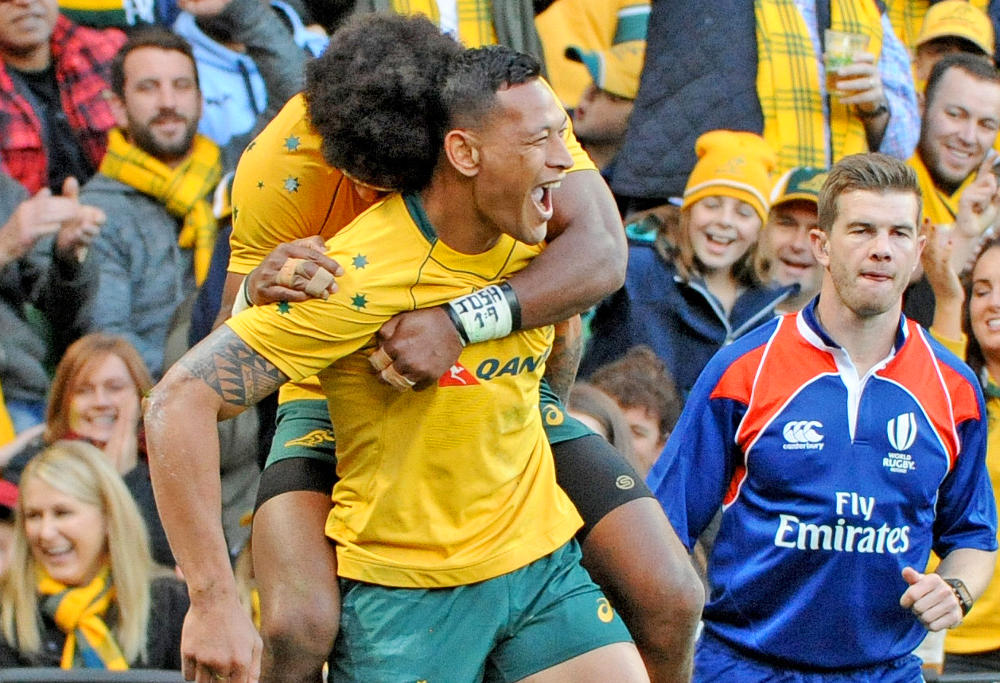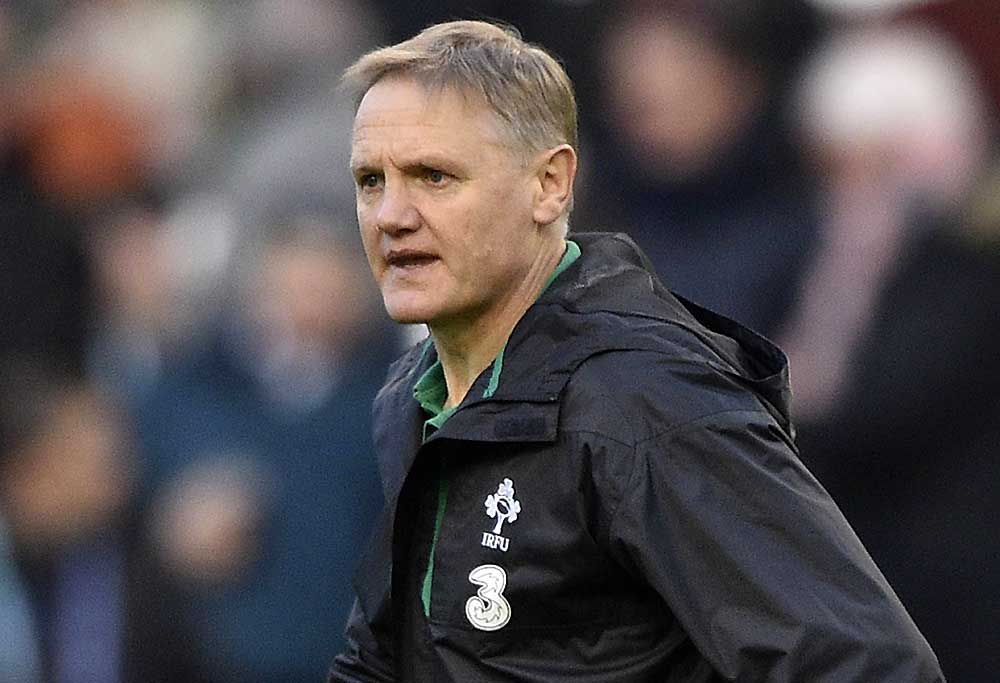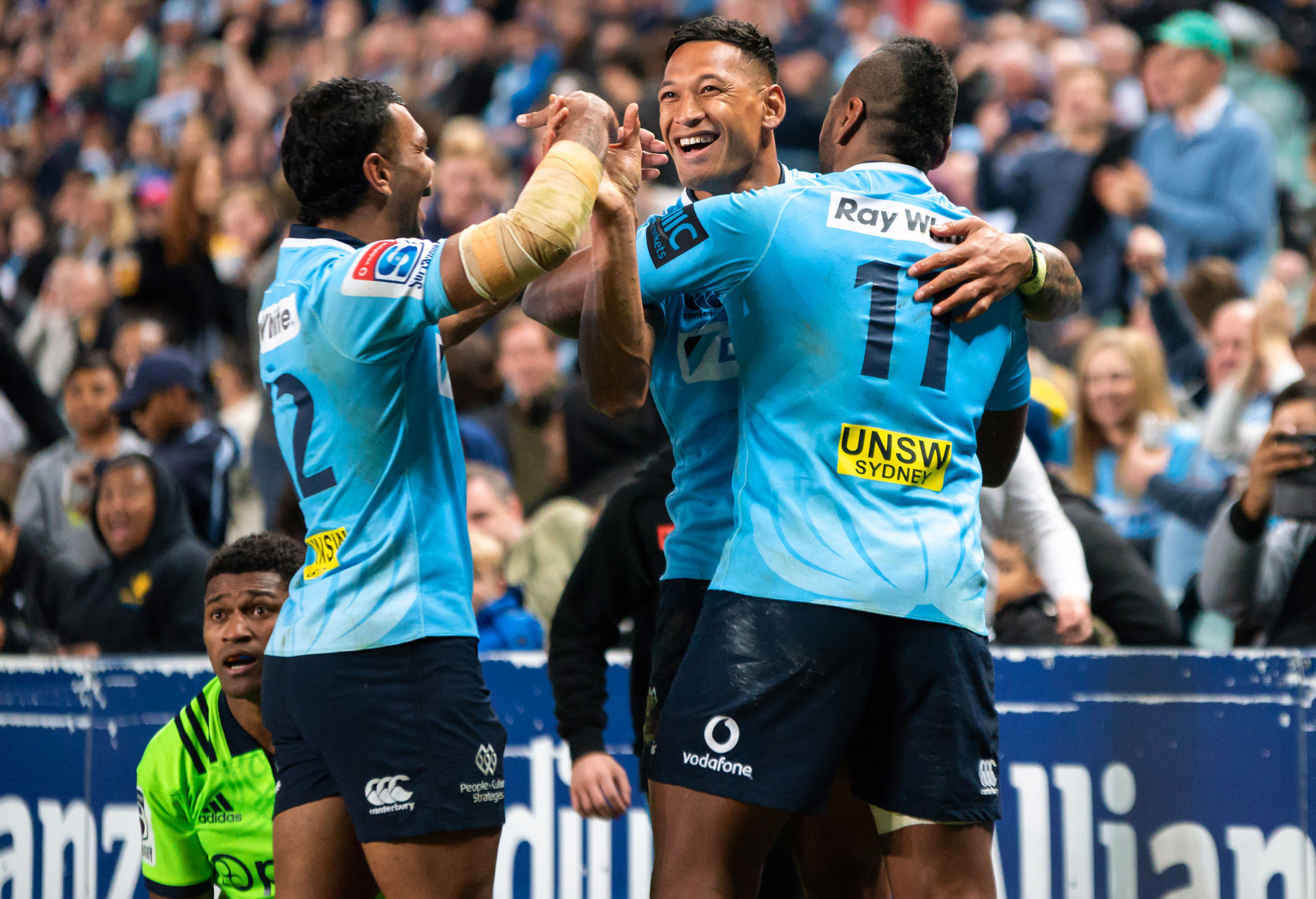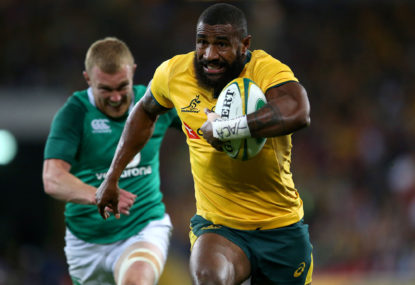The scoreline of Wallabies 18, Ireland 9 might seem tight but the victory at Brisbane has massive implications for the national side in the series, this year’s campaigns and, ultimately, during the 2019 Rugby World Cup tournament in Japan.
We saw from Michael Cheika’s Wallabies a new powerful, distinctive and effective method that built on the unique skills and physical strengths that the diversity in the squad offered the coaching staff to use in the team’s game plan.
The last time a Wallabies side was coached to play in a method that exploited the athletic strengths and skills of the players was during Rod Macqueen’s glorious era when every trophy available to his side to compete for, including the Webb Ellis Cup, was won.
The starting XV for the Wallabies at Brisbane contained nine players of Islander, Fijian, Aboriginal and Papua New-Guinean background. This is a startling change from the Wallabies sides in other years and should put an end to the nonsense put out, mainly from league adherents, that rugby is somehow a private school game.
A journalist always has to tread gently, trying to avoid stereotyping land mines, when writing about diversity of background.
But the fact of the matter is that the different body types offered by the Islander, Fijian, Aboriginal and Papua New Guinean background of the nine starters, and their four counterparts on the bench, has allowed the coaches to devise a game plan based on power and leaping skills that is unique right now to the Wallabies.
The Wallabies unleashed a power game on Ireland that embraced collisions on the ground and contests in the air.
The victory against the No.2 team in the world, unbeaten in their last 12 Tests, reinforced the truth that in the main the ground and air battles were won by the Wallabies.
I would make this comment about Israel Folau and his aerial skills, in this context of the new Cheika Wallabies. There is no player in the game right now, or in the past, that is so masterful in the air and so dynamic in his running once he comes to earth after one of his incredible catches than Folau.
He is rugby’s Cazaly. And for the first time for the Wallabies this “Up There Folau” talent has become a centre-piece of the Wallabies attacking method. About time, too.

(AAP Image/Joe Castro)
Ireland, with Rob Kearney and Jacob Stockdale leading the jumping, is actually a good team in the air. But they were virtually cleaned out in this dimension by Folau. It was this dominance in the air, from kick-offs, exits and high ball attacks, that lead to dominance in other areas of the game for the Wallabies.
The game plan was shrewd in that on defence Folau and Kurtley Beale dropped back. This two-fullbacks system allowed Beale to either race into the line on turnovers (Ireland uncharacteristically conceded 21 of these) where he is devastating with his running or put in bombs for Folau to chase and catch and create break-out attacks.
There was massive power in the tackle game of the Wallabies, too, where some of the hits registered high on the rugby Ritcher Scale for bone-shattering collisions.
On 164 carries, Ireland were reduced to only 9 clean breaks and 21 turnovers conceded. On 120 carries, the Wallabies made eight clean breaks and conceded 12 turnovers.
The Wallabies won the air battle, the scrum battle (with four of the five props and hookers being Islanders) and the battle of the advantage line. They scored two tries and held Ireland tryless.
There was a third “try” scored by the Wallabies by Israel Folau clearing out from the defence which was called back, correctly as Rod Kafer explained in his commentary, by the South African referee Marius van der Westhuizen, who did a fine job in his unruffled officiating.
Incidentally, David Pocock made a point of embracing Folau enthusiastically after this “try.” If Pocock can do this, why wouldn’t Fairfax Media at least drop its campaign to trash Folau on a weekly basis?
Getting back to Pocock, he had a masterful game at No.7, even though he was playing in the No.6 jersey. But the Wallabies lacked a real No.6 with height, weight and power running.
The lineout problems experienced, especially in the first half, could have been more problematic against a side like the All Blacks that has a more dynamic approach to attacking play.
This gets us to Ireland and what seemed to me, at least, to show a certain disrespect for the Wallabies and Super Rugby before the Test.
If Ireland had real respect for the Wallabies, why did coach Joe Schmidt not run on his strongest team?
He told interviewers before the match that he wanted to test whether Joey Carbery was a Test starter at number 10. Since when have important Tests, especially the crucial first Test of a three-Test series away from home, be a selection tryout?
Depending on the outcome of the Test series Schmidt could have experimented with Carberry later on.
Does anyone think that Schmidt will carry out a similar experiment in next year’s Six Nations tournament?
Tests against the Wallabies should not be regarded as trials. They are the real thing. Schmidt should not have put his best player Johnny Sexton and his strongest prop Tadh Furlong on the bench.

(AFP PHOTO / PAUL FAITH)
The lack of respect came through with the way Ireland played, as well. Schmidt did not pay the Wallabies the respect they deserved by creating a game plan that was tailored especially to defeat the Wallabies.
There was nothing new in the Ireland gameplan. It was the same plan as last year. The Wallabies were able to read the moves, even when Sexton was running things on the field, and only rarely was their defensive line put under pressure because they knew what to expect by the dutiful Ireland side.
There was an outstanding piece of defensive work by Dane Haylett-Petty in preventing CJ Stander from scoring a try, by somehow getting his legs under the ball before it was planted over the tryline, which reflected on the fine spirit sparking the Wallabies.
Ireland, on the other hand, seemed to be going through the motions with their 201 passes. This attitude of going through the motions is always dangerous for a team and makes it easier for oppositions to get on top of them by reading what is going to happen. It reflects, in my view, complacent coaching.
Schmidt has not done what Michael Cheika (the Wallabies), Steve Hansen (the All Blacks) and Rassie Erasmus (the Springboks) have done with their teams, namely added to and changed aspects of last year’s methods and game plans.
And this brings us to the third mark of Irish disrespect.
Here is Donal Lenihan, one of Ireland’s greatest forwards, on the Super Rugby tournament: “To be honest with you, a lot of people don’t place huge stocks on what’s happening in Super Rugby anymore… there was a time when we’d all look in awe at the quality of the rugby, but now there’s a feeling that it doesn’t prepare people for Test rugby.”
This is the same nonsense that Stephen Jones has peddled for years. You would think that people like him and Lenihan would have learnt from the 2015 RWC semi-finals, when all four teams, New Zealand, Argentina, Australia and South Africa, played out of SANZAAR and fielded teams in the Super Rugby tournament.
Three of these semi-finalists, Australia, New Zealand and South Africa had stirring victories against three top Six Nations teams over the weekend.
The Springboks came back, for instance, from being down 24-3 after 17 minutes to win 42-39.
New Zealand came back from being down 8-11 to France at half-time to score at a rate of a point a minute to win 52-11.
Wales, playing Super Rugby ensemble attacking rugby, defeated a stodgy Argentina 23 – 10.
The point about the Springboks and the All Blacks, in particular, is that they scored tries from inventive and sometimes powerful play when they needed to.
This is what the Super Rugby experience teaches players in these two countries and in Australia, too.
An example of this is the emergence of Israel Folau’s leaping game as a match-winner for his side. The tactic really blossomed when the Waratahs were going through a rough patch with winning results and needed something, anything, to give them an edge in their attacking game.

(Photo by Speed Media/Icon Sportswire via Getty Images)
What worked for the Waratahs in Super Rugby has now worked for the Wallabies in helping to defeat Ireland in the first Test at Brisbane.
This sets up a crucial test for both coaches.
What will Joe Schmidt do to stop Israel Folau dominating the air game and a tough Wallabies pack from dominating the collisions in their ground game?
And what further refinements of the new Wallabies game plan will Michael Cheika unveil at Melbourne to get a check-mate result there?
































































































